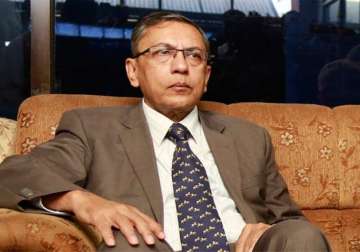India hopes 'difficult days' will not affect Indo-Nepal ties
Kathmandu: With Indo-Nepal ties witnessing unease after the promulgation of the new Constitution here, India today hoped that "difficult days" would not affect their friendship as it welcomed the Nepal government's move to hold talks

Kathmandu: With Indo-Nepal ties witnessing unease after the promulgation of the new Constitution here, India today hoped that "difficult days" would not affect their friendship as it welcomed the Nepal government's move to hold talks with agitating groups.
"We welcome the recent steps taken by the government of Nepal to hold dialogue with the agitating groups to end the existing political crisis in a peaceful manner," Indian Ambassador to Nepal Ranjit Rae said.
He said India wants stability in Nepal and it was not against the new Constitution.
"We see the Constitution as the culmination of violence and end of very brutal insurgency Nepal had gone through.
Nepal has come out of a very difficult situation and we don't want that it return to another difficult situation," Rae said during an interaction programme here.
"Nepal-India friendship is very old, solid and very much stable, and it doesn't depend on any specific issue or incident," he said, adding "I am confident even after these difficult days our friendship will be stronger."
On his part, Nepal's Ambassador to India Deep Kumar Upadhyaya hoped that there would be ease in supply of essential commodities from India soon as efforts are being made at diplomatic and political level in this regard.
Read Also: Cable TV operators in Nepal to blackout Indian channels
Asking people from both countries to observe tolerance and have a positive attitude towards dealing with the issue, the Nepalese envoy said, "India has always played an important role during the hardship faced by Nepal in the past which was evident during the recent earthquakes.
"Let's not speak irresponsible things and develop negative attitude towards each other at this sensitive time which might damage the centuries old friendly relations."
"We should maintain peace, stability and move towards economic prosperity and I hope India will extend support to our endeavour as a peaceful, stable and prosperous Nepal will also be in the interest of India," he said.
Rae also cautioned that if Nepal does not take every one along while drafting the Constitution then it will be sowing the seeds of future conflict as well as opening the door of instability that will also affect India.
"Therefore, the only solution to the current problem is talk," the Indian Ambassador added.
Meanwhile, Nepal's major parties yesterday started talks with the agitating Madhesi parties to find a solution to the Terai problem through peaceful means.
Madhesis are Indian-origin inhabitants of the Terai plains bordering India who are opposed to splitting Nepal into seven provinces.
”The friendship of India is not confined to a particular region, or southern plains, but we have the same family relations between Uttarakhand and Far-western Nepal as well as relations of eastern Nepal with our states in eastern India like Sikkim and West Bengal,” the Indian Ambassador said.
The three major parties—Nepal Congress, CPN-UML and UCPN-Maoist—yesterday formed a three-member committee to hold dialogue with the parties and groups agitating against the new Constitution.
Nepali Congress leader and Forest Minister Mahesh Acharya and CPN-UML Chief whip Agni Kharel and Narayankaji Shrestha from UCPN-Maoist are the members of the committee.
”We have already started dialogue with the Joint Madhesi Front and other agitating groups of the southern Nepal and the talks are moving towards a positive direction,” Acharya told PTI.
Mahanta Thakur, president of Terai Madhes Democratic Party and Bijaya Gachhadar, president of Madhesi Peoples Rights Forum Democratic, among others are taking part in the talks.
The agitation in the southern Nepal has entered 45th day and the country is reeling under scarcity of essential goods including petroleum products and cooking gas due to the blockade along the border areas with India.
Shortage of petroleum products have created panic among the people in Kathmandu, who are queuing for hours to fill petrol and diesel in their vehicles.
Normal life has been severely affected due to the growing tension in the border areas.
More than 40 people have been killed in over a month-long violence.